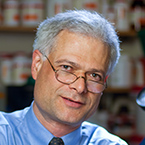
For pivotal contributions to the field of DNA damage and repair that have defined the specific defects responsible for the development of Fanconi anemia and for elucidating the role of nuclear protein complexes on chromatin remodeling, cell cycle checkpoints, and DNA repair.
A pioneer in the field of DNA damage and repair, Dr. D’Andrea has unraveled defects in the DNA repair pathway that contribute to the development of the autosomal recessive disease Fanconi Anemia (FA). In addition to FA, he has extensively studied ataxia telangiectasia (AT) and Bloom syndrome (BS), all chromosomal instability syndromes that have significantly contributed to the understanding of the interplay between DNA damage repair defects and cancer. Dr. D’Andrea’s research has characterized key components of the FA pathway including the Fanconi anemia group C protein (FANCC), responsible for apoptosis onset delay and promotion of DNA damage repair via homologous recombination, that when mutated may lead to FA and potentially acute myelogenous leukemia.
His research has also elucidated the role that the FA nuclear protein complex has on chromatin and ultimately cell cycle checkpoints and DNA repair. He demonstrated that this complex activates the D2 protein, which directly interacts with BRCA1 and BRCA2. Among the additional protein family members that Dr. D’Andrea and colleagues discovered is Fanconi anemia group D1 protein (FANCD1), which is identical to the breast cancer susceptibility protein BRCA2. These and additional findings from Dr. Andrea’s research group have contributed to the elucidation of the FA-BRCA pathway, mutated in a wide range of tumors. He has also identified biomarkers in the pathway that have been shown to predict response to cancer therapies. Dr. D’Andrea is also noted for cloning the erythropoietin receptor (EpoR), which promotes proliferation and rescues red blood cell progenitors from the apoptosis pathway and may be targetable to limit blood supply to tumors and ultimately inhibit growth and metastasis. He has also extensively studied, the cytokine-inducible deubiquitinating enzymes (DUB), cloning and characterizing multiple protein family members that are responsible for hematopoietic cell growth.
Selected Awards and Honors
2019 Lifetime Achievement Award, Fanconi Anemia Research Fund, Eugene, Oregon
2018 Ernest Beutler Lecture and Prize, American Society of Hematology, Washington, DC
2017 Member, National Academy of Medicine, Washington, DC
2015 Co-Leader, Stand Up To Cancer Dream Team for Ovarian Cancer, DNA Repair Therapies for Ovarian Cancer, Los Angeles, California
2012 AACR-G.H.A. Clowes Award for Outstanding Basic Cancer Research, American Association for Cancer Research, Philadelphia, Pennsylvania
2012 Elected Fellow, American Association for the Advancement of Science, Washington, DC
2009 Brian P. O’Dell Memorial Research Award, Leukemia and Lymphoma Society, Rye Brook, New York
2003 Elected Member, Association of American Physicians, Belleville, Michigan
2001 E. Mead Johnson Award for Research in Pediatrics, Society for Pediatric Research, The Woodlands, Texas
1997 Excellence in Research Award, American Academy of Pediatrics, Itasca, Illinois
1995 Scholar Award, Leukemia and Lymphoma Society, Rye Brook, New York
[Institutional affiliations listed for Fellows reflect those held at the time of their induction into the AACR Academy.]